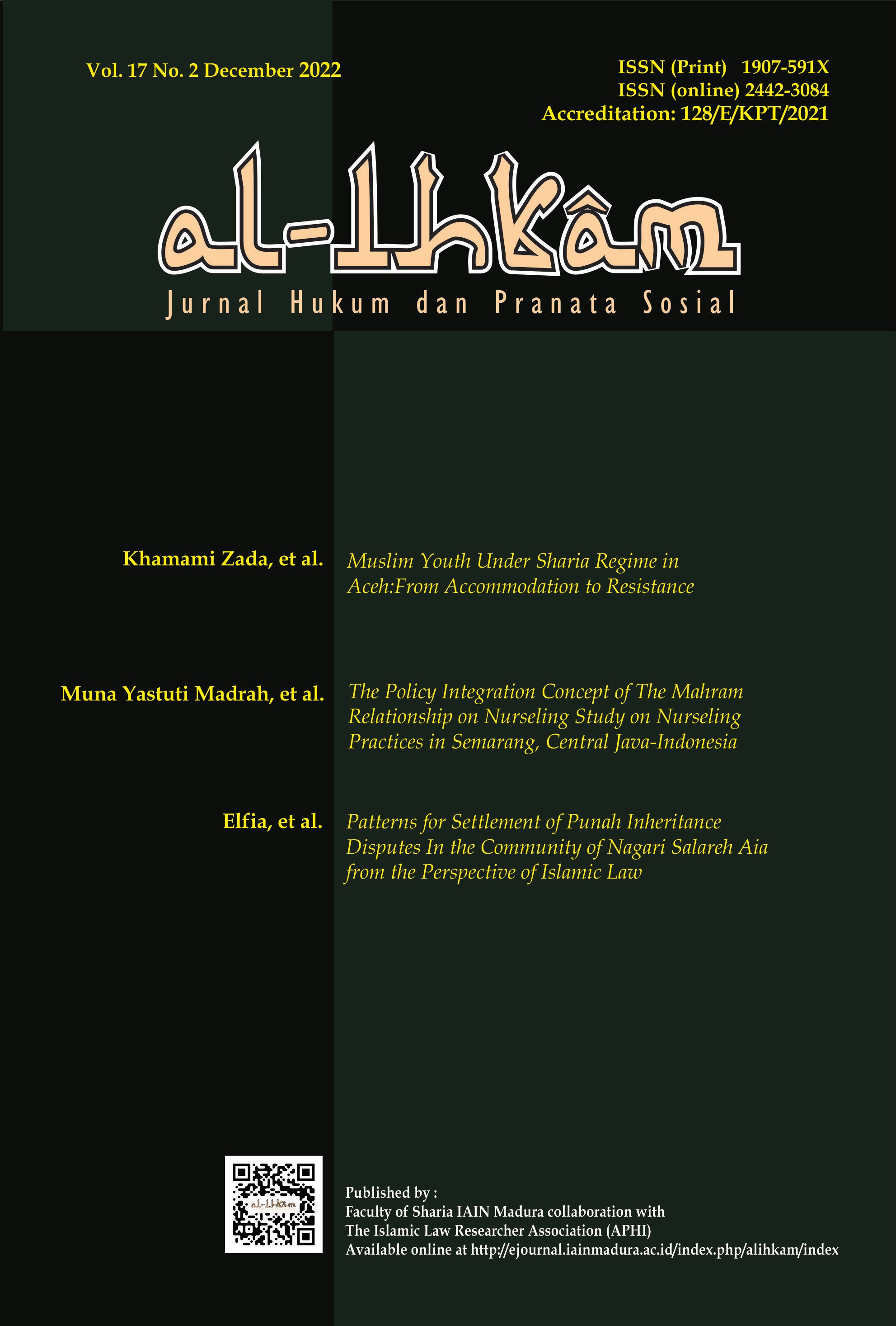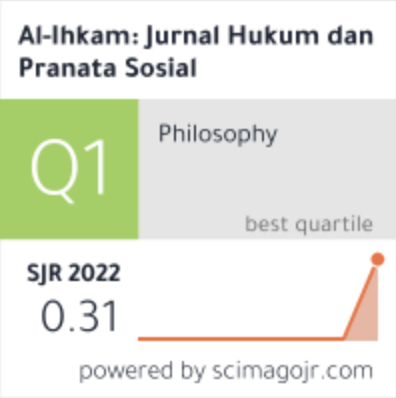Gender Equity in Inheritance System: The Collaboration of Islamic and Bugis Luwu Customary Law
 Abstract views: 1100
,
Abstract views: 1100
,
 PDF downloads: 772
PDF downloads: 772
Abstract
This article is the result of research on the cultural heritage of the Bugis people of Luwu, South Sulawesi. The research questions that were raised were: how is inheritance practiced among the indigenous people of Bugis Luo, what is the meeting point of inheritance between Islamic law and customary law, and how do Islamic law and customary law combine to create gender. Primary data was collected through in-depth and structured interviews, as well as on-site observation. The analysis was performed using interpretive methods. The study was conducted by analyzing the regulations related to the legal issues discussed by analyzing the laws and comparing the decisions of the Luwu and Bugis courts with the perspective of customary law and Islamic law. The analysis used in this study resulted in women and men being equal. Bugis Luwu Sulawesi has a pluralistic hereditary system with both Islamic and traditional elements. Equal rights and rules are general ideas. This research is based on the proposed mixed inheritance model: masssideppungeng that links the heirs to family, government, and religious customary authorities, the distribution of assets to field conditions, and proportionally identifies the needs, wants, and goals of the inheritors.
Downloads
References
Ahmad, Mahtab, Moazma Batool, and Sophia F Dziegielewski. “State of Inheritance Rights: Women in a Rural District in Pakistan.” Journal of Social Service Research 42, no. 5 (October 2016): 622–29. https://doi.org/10.1080/01488376.2016.1177633.
Bericat, Eduardo. “The European Gender Equality Index: Conceptual and Analytical Issues.” Social Indicators Research 108, no. 1 (2012): 1–28.
Carter, Michael. “Gender Socialization and Identity Theory.” Social Sciences 3, no. 2 (May 2014): 242–63. https://doi.org/10.3390/socsci3020242.
Cooper, Elizabeth. “Inheritance and the Intergenerational Transmission of Poverty in Sub-Saharan Africa: Policy Considerations.” Chronic Poverty Research Centre Working Paper, no. 159 (2010).
Doss, Cheryl, Mai Truong, Gorrettie Nabanoga, and Justine Namaalwa. “Women, Marriage and Asset Inheritance in Uganda.” Development Policy Review 30, no. 5 (September 2012): 597–616. https://doi.org/10.1111/j.1467-7679.2012.00590.x.
Ezeilo, Joy Ngozi. “Rethinking Women and Customary Inheritance in Nigeria.” Commonwealth Law Bulletin 47, no. 4 (October 2021): 706–18. https://doi.org/10.1080/03050718.2020.1818596.
Fahmi, Muhammad, Irwan Abdullah, Hasanah Hasanah, Imam Mujahid, and Misbah Zulfa Elizabeth. “MEDIA REPRESENTATIONS OF GENDER: THE MARGINALIZATION OF FEMALE MUSLIM SCHOLARS IN INDONESIA.” Journal of Critical Reviews 7, no. 05 (March 2020). https://doi.org/10.31838/jcr.07.05.44.
Febriawanti, Dinta, and Intan Apriyanti Mansur. “Dinamika Hukum Waris Adat Di Masyarakat Bali Pada Masa Sekarang.” Media Iuris 3, no. 2 (July 2020): 119. https://doi.org/10.20473/mi.v3i2.18754.
Fikri, Fikri. “(Peer Review) Konsepsi Hukum Waris Islam Dan Hukum Waris Adat: Analisis Kontekstualisasi Dalam Masyarakat Bugis,” 2022.
Groce, Nora Ellen, Jillian London, and Michael Ashley Stein. “Inheritance, Poverty, and Disability.” Disability & Society 29, no. 10 (2014): 1554–68.
Gultom, Elfrida R. “DEVELOPMENT OF WOMEN POSITION IN THE PATRILINEAL INHERITANCE OF INDONESIAN SOCIETY.” Jurnal Dinamika Hukum 17, no. 2 (May 2017): 194. https://doi.org/10.20884/1.jdh.2017.17.2.886.
Haniru, Rahmat. “Hukum Waris Di Indonesia Perspektif Hukum Islam Dan Hukum Adat.” Al-Hukama’: The Indonesian Journal of Islamic Family Law 4, no. 2 (2014): 456–74.
Haque, Muhammad Faizul, Sohirin Mohammad Solihin, Nadzrah Ahmad, and Mohd Shah Jani. “Women Rights to Inheritance in Muslim Family Law: An Analytical Study.” International Journal of Islamic Business & Management 4, no. 1 (April 2020): 15–26. https://doi.org/10.46281/ijibm.v4i1.543.
Jackson, Sue. “Young Feminists, Feminism and Digital Media.” Feminism & Psychology 28, no. 1 (February 2018): 32–49. https://doi.org/10.1177/0959353517716952.
Jafar, Usman, Mawardi Djalaluddin, and Nur Taufiq Sanusi. “EKSISTENSI HUKUM WARIS ADAT DALAM MASYARAKAT MUSLIM DI KOTA GORONTALO DALAM PERSPEKTIF SEJARAH.” Jurnal Diskursus Islam 6, no. 2 (August 2018): 361–401. https://doi.org/10.24252/jdi.v6i2.6866.
Lilik Andar Yuni, Murjani. “Gender Sensitivity at Judge’s Verdicts in Samarinda and Magelang Religious Courts; The Implementation of PERMA Number 03 of 2017.” Al Ihkam : Jurnal Hukum Dan Pranata Sosial 15, no. 2 (2020). https://doi.org/https://doi.org/10.19105/al-lhkam.v15i2.2714.
Maimun, Ainul Haq Nawawi, Abdul Haq Syawqi. “The Development of Fiqh Munākaḥah (Marriage Jurisprudence) Material Course in Madurese Islamic Universities and Its Relation with Gender Equality and Divorce Prevention.” Al Ihkam : Jurnal Hukum Dan Pranata Sosial 15, no. 2 (2020). https://doi.org/https://doi.org/10.19105/al-lhkam.v15i2.2734.
Mernissi, Fatima. “Beyond the Veil, Revised Edition: Male-Female Dynamics in Modern Muslim Society.” Saqi Books, 2011.
Mostofa, Md. “Rules and Practices of Women’s Inheritance Rights in Islam: Bangladesh Perspective.” International Journal of Islamic Business & Management 3, no. 1 (April 2019): 14–20. https://doi.org/10.46281/ijibm.v3i1.245.
Mulyadi, Mohammad. “Pemberdayaan Masyarakat Adat Dalam Pembangunan Kehutanan.” Jurnal Penelitian Sosial Dan Ekonomi Kehutanan 10, no. 4 (2013): 224–34.
Nasution, Khoiruddin. “PERAN KURSUS NIKAH MEMBANGUN KELUARGA SEJAHTERA.” AHKAM:Jurnal Ilmu Syariah 15, no. 2 (March 2016). https://doi.org/10.15408/ajis.v15i2.2862.
Nurhayanto, Puji, and Dadan Wildan. “Transformasi Nilai-Nilai Kearifan Lokal Masyarakat Adat Cireundeu.” SOSIETAS 6, no. 1 (2016).
Rahardjo, Turnomo, Hapsari D Sulistyani, and Taufik Suprihatini. “Digital Media Literacy in Samin Indigeneous People.” Edited by Hadiyanto, Maryono, and Budi Warsito. E3S Web of Conferences 73 (December 2018): 14018. https://doi.org/10.1051/e3sconf/20187314018.
Reo, Nicholas James, and Kyle Powys Whyte. “Hunting and Morality as Elements of Traditional Ecological Knowledge.” Human Ecology 40, no. 1 (2012): 15–27.
Ruzycki, Shannon M, Georgina Freeman, Aleem Bharwani, and Allison Brown. “Association of Physician Characteristics With Perceptions and Experiences of Gender Equity in an Academic Internal Medicine Department.” JAMA Network Open 2, no. 11 (November 2019): e1915165. https://doi.org/10.1001/jamanetworkopen.2019.15165.
Saputra, Asbudi Dwi. “PEMBAGIAN HARTA WARIS MENURUT SISTEM KEWARISAN HUKUM ADAT RONGKONG STUDI MASYARAKAT ADAT DESA MARAMPA KECAMATAN RONGKONG KABUPATEN LUWU UTARA.” Journal I La Galigo : Public Administration Journal 3, no. 1 (July 2020): 24–31. https://doi.org/10.35914/ILAGALIGO.394.
Sharma, Radha R, and Neha P Sharma. “Opening the Gender Diversity Black Box: Causality of Perceived Gender Equity and Locus of Control and Mediation of Work Engagement in Employee Well-Being.” Frontiers in Psychology 6 (2015): 1371.
Sihombing, Deo Andika Putra. “Pembagian Waris Adat Masyarakat Suku Bugis Di Kecamatan Enok, Kabupaten Indragiri Hilir, Provinsi Riau.” PREMISE LAW JURNAL 1 (2017).
Siska, Eti, Firman Firman, and Rusdinal Rusdinal. “Pergeseran Hukum Waris Adat Di Minangkabau (Studi Kasus: Hukum Warisan Tanah Ulayat Di Nagari Ladang Panjang Kecamatan Tigo Nagari, Kabupaten Pasaman, Sumatera Barat).” Culture & Society: Journal Of Anthropological Research 1, no. 2 (December 2019): 157–63. https://doi.org/10.24036/csjar.v1i2.26.
Sulong, Jasni. “Kedudukan Mazhab Syafi’i Dalam Amalan Pembahagian Pusaka Dan Wasiat Islam Di Malaysia.” Jurnal Syariah 16, no. 1 (2008): 163–83.
Syarifuddin, Amir. “Hukum Kewarisan Islam.” Kencana, 2011.
Whyte, Kyle. “What Do Indigenous Knowledges Do for Indigenous Peoples?” In Traditional Ecological Knowledge, 57–82. Cambridge University Press, 2017. https://doi.org/10.1017/9781108552998.005.
Copyright (c) 2022 AL-IHKAM: Jurnal Hukum & Pranata Sosial

This work is licensed under a Creative Commons Attribution-ShareAlike 4.0 International License.
In order to be accepted and published by Al-Ihkam: Jurnal Hukum dan Pranata Sosial, author(s) submitting the article manuscript should complete all the review stages. By submitting the manuscript, the author(s) agreed to the following terms:
- The copyright of received articles shall be assigned to Al-Ihkam: Jurnal Hukum dan Pranata Sosial as the publisher of the journal. The intended copyright includes the right to publish articles in various forms (including reprints). Al-Ihkam: Jurnal Hukum dan Pranata Sosial maintain the publishing rights to the published articles.
- Authors are permitted to disseminate published articles by sharing the link/DOI of the article at Al-Ihkam: Jurnal Hukum dan Pranata Sosial. Authors are allowed to use their articles for any legal purposes deemed necessary without written permission from Al-Ihkam: Jurnal Hukum dan Pranata Sosial with an acknowledgment of initial publication to this journal.
- Users/public use of this website will be licensed to CC-BY-SA.



.png)
_1.png)










